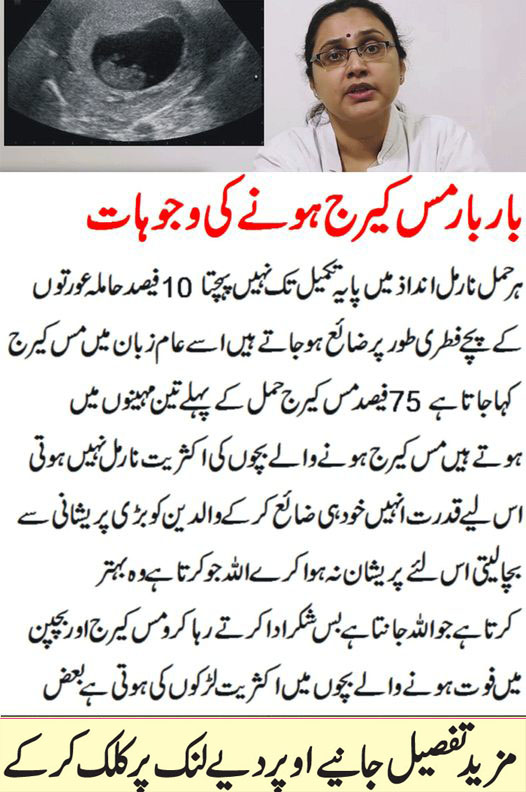As soon as a girl is married, she is barraged with embarrassing questions as to when she will conceive a child. The frequency of such questions and their underlying fervour imply that pregnancy is somewhat sacred, nothing short of a blessing. Ever notice how expecting mothers do not disclose their pregnancy until way past the first trimester? That is a consequence of such a mindset.
Advertisement
Once the initial stages have passed, women rarely have a problem with speaking about pregnancy, morning sickness and delivery options, etcetera. Everything under the sun, from potty training to nursery decorations is discussed. But when it comes to one aspect of motherhood, everyone falls silent.
Hamal Zaya Hone Ki Wajohat Aur Nishanian
What-Causes-a-Miscarriage

https://www.youtube.com/watch?v=WHDRuyFZwFA
infertility
bivi-ke-hath-ka-khana
Vaginal Yeast Infection
It is surprising that the topic of miscarriage still evokes such fear and rejection among women, regardless of their social class. This stigmatisation of miscarriages — which, medically and logically speaking, are beyond an individual’s control — leads to the demeaning of women everywhere.
What is miscarriage?
Although every woman has a different experience of a miscarriage, the typical physical symptoms include cramping and bleeding. This is contingent upon a variety of factors, such as the stage of the pregnancy as well as medical history.
According to the Medical Encyclopaedia of the United States Library of Medicine, a miscarriage is a spontaneous loss of the developing foetus usually within the first 20 weeks of pregnancy. Almost half of the miscarriages occur even before a woman knows she is pregnant. “My patients are often concerned about whether any of their routine activities or eating habits could have been one of the causes of the miscarriage,” informs Dr Shameem, a gynaecologist and private practitioner. “However, the major cause is a chromosomal inadequacy,” she adds. Scientifically, when a foetus has an inadequate number of chromosomes, it begins to separate, therefore causing external bleeding.
Moreover, other causes such as unprompted termination of pregnancy due to excessive drug usage or smoking can also lead to a miscarriage. Infections or diseases such as obesity, or age and medical issues relating to a woman’s reproductive organs are amongst the perpetrators as well. Polycystic ovarian syndrome (PCOS) for instance — a condition wherein tiny cysts develop on the uterus — is a leading cause of infertility and miscarriages.
What causes a miscarriage?
It is highly unlikely that you will ever know the actual cause of a one-off miscarriage, but most are due to the following problems:
ABNORMAL FETUS
The most common cause of miscarriages in the first couple of months is a one-off abnormal development in the fetus, often due to chromosome anomalies. ‘It’s not as though the baby is fine one minute and suddenly dies the next,’ says Professor James Walker, Professor of Obstetrics and Gynaecology at the University of Leeds.
‘These pregnancies fail from the outset and were never destined to succeed.’ Most miscarriages like this happen by eight weeks, although bleeding may not start until three or four weeks later, which is worth remembering in subsequent pregnancies. ‘If a scan at eight weeks shows a healthy heartbeat, you have a 95 per cent chance of a successful pregnancy,’ says Professor Walker.
HORMONAL FACTORS
A hormonal blip could cause a sporadic miscarriage and never be a problem again. However, a small number of women who have long cycles and irregular periods may suffer recurrent miscarriages because the lining of the uterus is too thin, making implantation difficult.
Unfortunately, hormone treatment is not terribly successful.
‘There used to be a trend for progesterone treatment, but trials show this really doesn’t work,’ warns Professor Walker. ‘There is some evidence that injections of HCG (human chorionic gonadotrophin, a hormone released in early pregnancy) can help, but it’s not the answer for everyone.’ The treatment must be started as soon as the pregnancy is confirmed, at around four or five weeks.
AGE
For women over 40, one in four women who become pregnant will miscarry. [One in four women of all ages miscarry, but these figures include women who don’t know that they are pregnant. Of women who do know that they’re pregnant, the figure is one in six. Once you’re over 40 and know that you’re pregnant, the figure rises to one in four]
AUTO-IMMUNE BLOOD DISORDERS
Around 20 per cent of recurrent miscarries suffer from lupus or a similar auto-immune disorder that causes blood clots to form in the developing placenta.
A simple blood test, which may need to be repeated several times, can reveal whether or not this is the problem.’One negative test does not mean that a woman is okay,’ warns Mr Roy Farquharson, consultant gynaecologist who runs an early pregnancy unit at the Liverpool Women’s Hospital.
Often pregnancy can be a trigger for these disorders, so a test should be done as soon as possible,’ he adds. But it can easily be treated with low dose aspirin or heparin injections, which help to thin the blood and prevent blood clots forming – a recent trial also showed that women do equally well on either. ”We have a 70 per cent live birth rate in women treated for these disorders,’ says Dr Farquharson, ‘which is excellent.’



